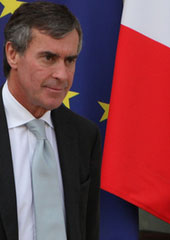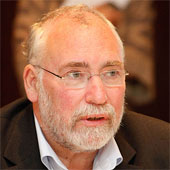France’s Cahuzac Affair: Not Just a National Farce
With so many scandals, is it any wonder that people not just in France, but everywhere are losing faith in their elected governments?
April 11, 2013

It could easily have been the script of a play by Georges Feydeau, the French playwright who lived from 1862 to 1921 and was especially known for his theatre of farces and the absurd.
Imagine the storyline that has transpired so far: A new Socialist government is elected. The president, played by François Hollande, dour-faced as he tends to be, vows to pursue a policy of uncompromising puritanism.
All of his ministers are forced to sign a probity pledge. They vow to be clean and completely above-board. No shady dealings here.
After all, attacking the abuses of the rich is a priority of the Parti Socialiste, including destroying the “fiscal paradises” that, often callously promoted by U.S. and British politicians, provide havens for tax fraud and tax evasion.
Just a few months later, amidst a devastating fiscal and economic crisis, high levels of unemployment and the imposition of what the French call “rigeur,” a minister of the government, Jérôme Cahuzac — a towering figure, former surgeon and amateur boxer — is accused of having an illegal offshore account.
Reports claim that he had practiced tax evasion for 20 years. He strenuously denies the accusations to the media, to the French parliament and to the people.
He is rigorous and self-righteously pompous — until the very moment that he is forced to quit, after evidence has emerged that it is all true.
Quiz question: Imagine what substantive policy issue Cazuhac was in charge of in the Hollande government? Culture, perhaps? Or family and sports?
Those guesses are wide of the mark. Mr. Cazuhac served as minister of the budget, with direct responsibility for, among other things, leading the battle against tax fraud and tax evasion.
What is the French word for immense chutzpah? Le culot.
But rich as this material is in the comedy department, it is just the beginning of this farce. With every hour that passes, new details emerge, new players are identified and new twists appear.
Now, France’s center-right is also undergoing some judicial turbulence. Christine Lagarde, the former finance minister and now managing director of the IMF in Washington, and former President Nicolas Sarkozy are both under investigation.
For what? Criminal financial offences, of course. The greatest political beneficiary of this cesspool is thought to be Marine Le Pen, leader of the far-right party Front National.
But wait, there’s more! Entering the spotlight is Philippe Peninque, a close friend of Marine Le Pen’s. He is a lawyer who specializes in fiscal issues and has admitted to having been the one who advised Cahuzac. In fact, he set up the Swiss bank account on his behalf back in 1992.
The big question now is what did François Hollande, his Prime Minister Jean-Marc Ayrault and the Finance Minister Pierre Moscovici (Cahuzac’s boss) know and when did they know it?
Since all French political parties have skeletons in their closets, there may very well be a concerted effort to hush things up and let the scandal peter out.
There are, however, other scenarios, including an extreme one in which the whole government, possibly including the president, is forced to resign: a French Watergate.
One thing is for sure: The French media will remain very vigilant. The electorate is thoroughly disillusioned and the media could use a political cratering of the parties to resuscitate its own fortunes, at least in the sense of proving their utility to the wider French public.
While it may be a farce, it isn’t funny. To paraphrase Hamlet: “Something is rotten in the state of France.”
But it is not just France, nor is it just Europe. Along with multiple crises (financial, economic, social, environmental, etc.), the world is facing a legitimacy crisis at this early juncture of the 21st century.
Scandals and crises are besetting many — if not all — of the world’s major democracies. For particularly shameful proof, look no further than the world’s biggest democracy, India, where corruption investigations are allegedly being used to settle political scores.
Not that dictatorship is any better. In China, corruption is destroying the very fabric of society and the environment, as grotesquely illustrated by the 16,000 dead pigs recently found floating in the Huangpu River in Shanghai.
The Cahuzac farce is just another sordid illustration of the systemic and moral rut the world is wallowing in. We have to get out of it!
Of course, the Cahuzac affair is likely to put even more people off politics. Ideally, the effect should be the opposite: Citizens should take back politics.
In democracies, we are all responsible for the leaders we have. As the Irish philosopher Edmund Burke is reported to have said: “All that is necessary for evil to triumph is for good men to do nothing.”
This must be a time of political engagement, not disengagement.
Takeaways
It is not just France, nor is it just Europe. Scandals are also besetting many other — if not all — the world's major democracies.
These scandals are likely to put even more people off politics. Ideally, the effect would be the opposite.
We are all responsible for the leaders we have. This should be a time of political engagement, not disengagement.
Irony or farce: Attacking the abuses of the rich is a priority of France's Socialist Party, including "fiscal paradises."
Read previous

Thatcher, Merkel and the Euro
April 10, 2013
